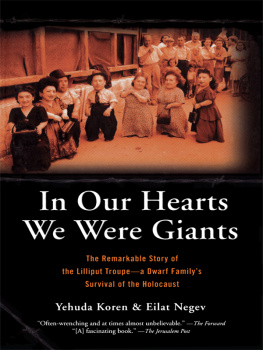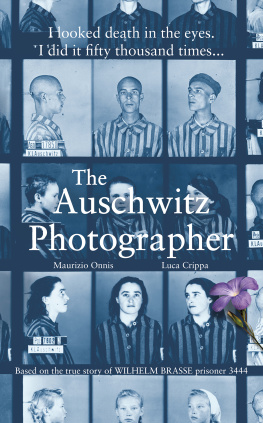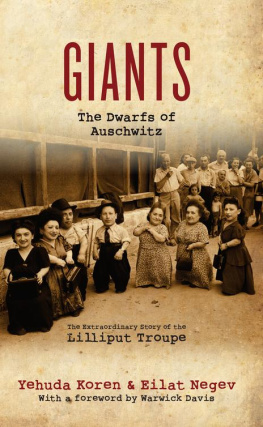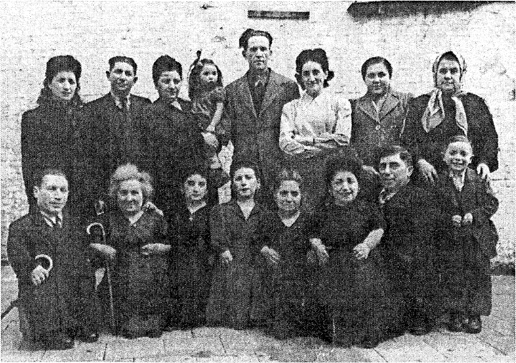The Ovitz Family, Antwerp, 1949.
In Our Hearts
We Were Giants
The Remarkable Story of the Lilliput Troupe
A Dwarf Familys Survival of the Holocaust
YEHUDA KOREN
and
EILAT NEGEV
CARROLL & GRAF PUBLISHERS
NEW YORK
IN OUR HEARTS WE WERE GIANTS
The Remarkable Story of the Lilliput Troupe
A Dwarf Familys Survival of the Holocaust
Carroll & Graf Publishers
An Imprint of Avalon Publishing Group Inc.
245 West 17th Street 11th Floor
New York, NY 10011
Copyright 2004 by Yehuda Koren and Eilat Negev
First Carroll & Graf edition 2004
IM HERZEN WAREN WIR RIESEN,
2003 by Ullstein Heyne List GmbH. & Co. KG, Munich
All rights reserved. No part of this book may be reproduced in whole or in part without written permission from the publisher, except by reviewers who may quote brief excerpts in connection with a review in a newspaper, magazine, or electronic publication; nor may any part of this book be reproduced, stored in a retrieval system, or transmitted in any form or by any means electronic, mechanical, photocopying, recording, or other, without written permission from the publisher.
Library of Congress Cataloging-in-Publication Data is available.
ISBN-10: 0-7867-1555-3 ISBN-13: 978-0-7867-1555-8
eBook ISBN: 9780786715558
Endpaper photo: A rare photo of the Lilliput Troupe before the war. Left to right: Elizabeth (drums), Rozika, Perla, Frieda, Franziska, Micki. Avram, the master of ceremony, is absent from the photo. (Courtesy of the Ovitz family)
Design by Simon M. Sullivan
Printed in the United States of America
Distributed by Publishers Group West
To our mothers, Sarah and Rachel
PROLOGUE
T heres a long pause after the chime echoes inside. No ray of light sneaks from under the door, no muffled noises disturb the quiet afternoon.
Two peepholes, one above the other, catch the eye. The lower is just thirty inches above the ground. Until not long ago, Perla Ovitz would drag herself to the door and, peeking out, try to guess by the look of the trousers or the dress hem if the person on the other side was friend or foe. Nowadays, confined to her bedroom, shes too weak to make the journey. Her vigorous voice erupts from a loudspeaker in the hallway; it demands identification. Then theres a buzz, and you can push the heavy brown door open. You blink in the dusky corridor. Youre not sure how to continue, for fear of slipping or bumping into concealed furniture, or, worse, stumbling over your hostess. Shes under three feet tall. Her voice is your compass, guiding you forward. You grope blindly toward a diminutive silhouette in the doorway of the dimly lit room. She waits at the threshold in a full-length, majestic crimson dress and allows her visitor to tiptoe past. You step carefully inside. Then, she waddles in.
It is her bedroom. The legs of the double bed have been sawn off and although it is practically lying on the floor, a small stool stands next to it, to enable her climb into sleep. Beyond a kindergarten table and chairs is a child-sized washbasin. From your towering angle, theres not much difference in her height if shes standing up or sitting on the edge of the bed. Your first impulse is to shrink down, so as not to dwarf her with your presence. She nods toward the normal-sized sofa beside her bed. You take care to keep your feet on the ground, as crossing your legs will place your shoes in front of her face.
The raven-black hair of the ageless doll-like lady is carefully combed back and held in place by a velvet bow, in old-fashioned Hollywood style. Shes theatrically made upher cheeks are rouged, her nails are lacquered shiny red. She wears earrings, a necklace, rings. As long as you breathe, you should look your best. I dont want people to pity me. Its a motto she is fond of repeating.
She enchants with her dazzling smile, and her bubbly talk is studded with unexpected aphorisms. A beaten dog dreads even the kindest people, for instance, is how she excuses her cautiousness. She spends most of her time sitting on her petite chair, or reclining, dressed, on her covered bed, as these days she can stand no more than a minute or two unaided.
Shes on her own most of the day, and needs everything to be easily accessiblea packet of chocolate cookies and a plastic box of sliced apples lie on the bed should she get hungry. A thermos of water waits within reach.
She cant move without her cane, which serves as an extended hand, to pull, press, push. Tiny stools scattered through the house allow her to rest at any time in her movements around her rooms. All the light switches have been lowered to her height. The kitchen has a knee-high stove, and a special mechanism allows her to open the refrigerator door with a push of her cane. All the food is stored on the bottom shelf.
Vases that stand as tall as her hold abundant bouquets of silk and plastic flowers in her favorite colors: sharp violets, soft pinks. A heavy red curtain at the wide entrance to the living room is pulled to both sides and gathered in thick cords, as if a show were about to begin. Forty-five years have passed since Perla Ovitz took her last bow, but the stage stays with her still. When all her family still surrounded her, she loved the lights; she even flooded herself with them offstage, at home. Now, trapped alone in the big empty apartment, she seeks the economy and safety of dimmed lamps and half shadows.
Perlas memories, though, remain vividin their glories and their horrors. Hers is a true story of seven dwarfs. Its a story, however, that delivers Perla and her brothers and sisters not into the arms of a benevolent Snow White, but into the grip of a beast. Its a story that ultimately takes them into some of the darkest corners of hell that human beings have ever experienced. And its a story that they survived.
ONE
Transylvania, 1868
T he story begins with giants.
In long-gone days, it is said, in hilly northern Transylvania, the Dolhai Valley was strewn with tribes of giants. For ages upon ages since the creation, they lived and prospered and roamed the earth. Then came the deluge, and they all fled to the peaks of the mountains. There, one by one, they perished, and when the waters receded, only two had survived: a giant and his daughter, Roza Rozalina. Her eyes black as coal, her hair as red as flame and as long as the sadness of the fir trees, sorrowfully she wandered through the valley.
Father, she sighed, Im withering with loneliness. Will I ever find a mate? She headed toward the Iza River and, daydreaming, strolled along the bank. All of a sudden, she spotted tiny creatures ploughing between the grass blades. Roza Rozalina was astonished: never had she seen creatures so similar to her, and yet so small. She picked up a handful and nestled them in her apron. These moving toylike creatures would rescue her from boredom, she thought. She examined them closely. One in particular caught her eye. He was handsome as the moon and appeared to be less frightened than the others. Her cheeks blushed as she felt the pangs of love.















